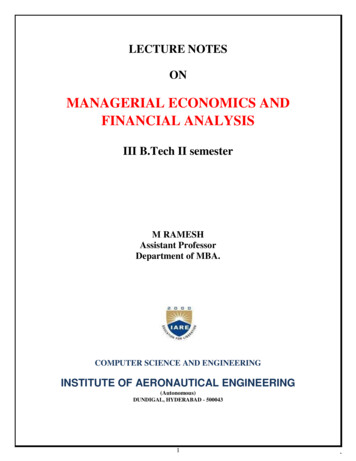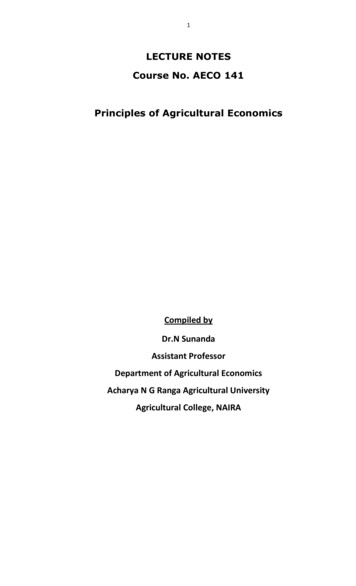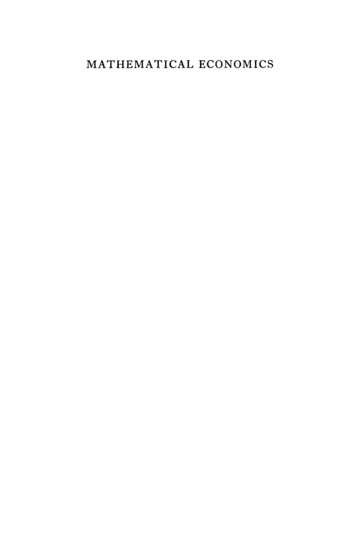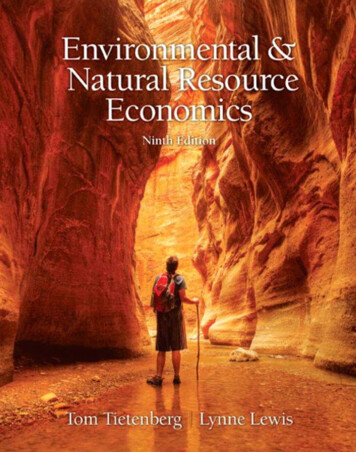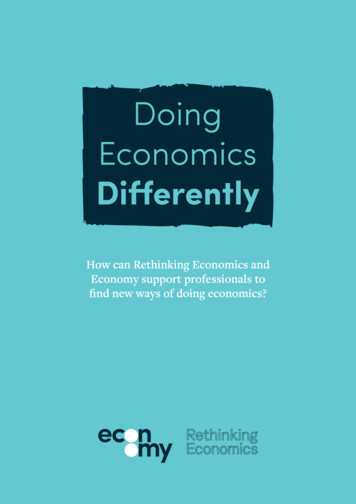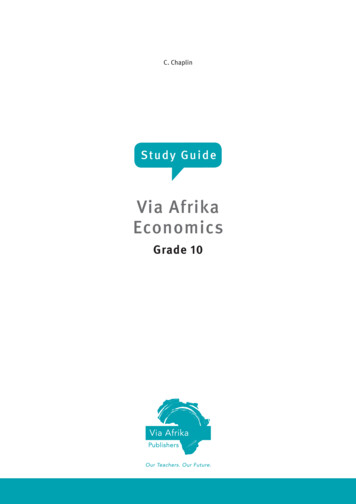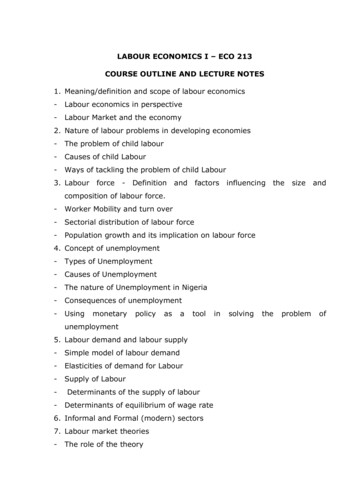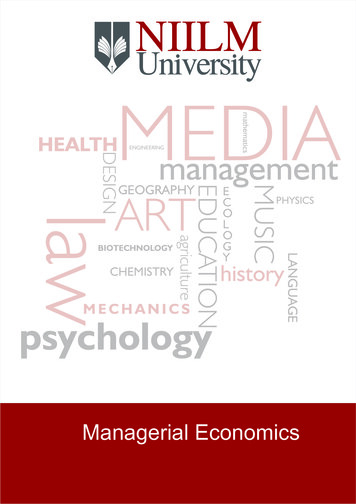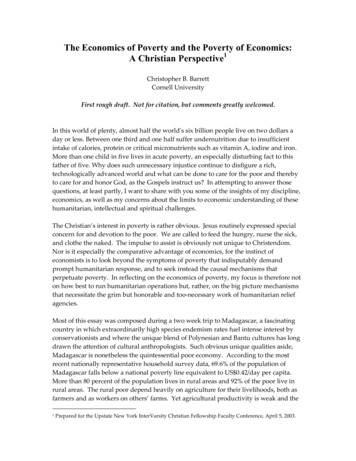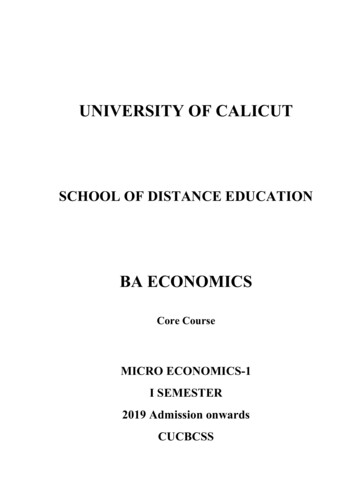
Transcription
UNIVERSITY OF CALICUTSCHOOL OF DISTANCE EDUCATIONBA ECONOMICSCore CourseMICRO ECONOMICS-1I SEMESTER2019 Admission onwardsCUCBCSS
MICRO ECONOMICS-1I SEMESTERCore CourseBA ECONOMICS(2019 Admission onwards)(CUCBCSS)UNIVERSITY OF CALICUTSCHOOL OF DISTANCE EDUCATIONCalicut University (P.O), Malappuram, Kerala, India 673635
UNIVERSITY OF CALICUTSCHOOL OF DISTANCE EDUCATIONStudy MaterialBA- Economics(2019 Admission)I SemesterECO1B01- Micro Economics -1Prepared byDr. Shiji O.(Assistant Professor, SDE, University ofCalicut)Mr. Ajesh Babu K.P.(Assistant Professor, SDE, University ofCalicut)
ContentsModule IExploring the Subject Matter of EconomicsModule IIDemand and Supply AnalysisModule IIITheory of Consumer BehaviourModule IVTheory of Production and Costs
Module IExploring the Subject Matter of EconomicsIntroductionWelcome to the science of economics. Yes, economics is a social science, like chemistry is a physicalscience. It is true that there are no test tubes and sophisticated equipment required to study economics,but Just as physical sciences are means to understand how the real physical world around us works our planet, the solar system or the universe - in economics, we try to understand how the economy of aparticular region, a country or the global economy works. There are principles or laws of economics(parallel to laws of Chemistry or physics).With the help of these principles; we analyze how aneconomy works. There is no universally accepted, single, definition of economics. But we canunderstand what it is about. Many non-economists think that it only concerns the matters of money how to make or manage money. Not true. Economics is about making choices in the presence ofscarcity. The notions “scarcity” and “choice” is very important in economics. You may not see thesewords in all chapters to come, but they are in the background throughout. Scarcity and choice gotogether if things were available in plenty (literally) then there would have been no choice problem;you can have anything you want. Unfortunately, this may be true only in heaven, not in the real world.Even the richest person on earth would have to face scarcity and make choice. If nothing else, time isscarce. Ratan Tata, a leading Industrialist of India, between 6 p.m. and 8 p.m. in a particular evening,may have to decide whether to go to a musical concert, or just keep working in his office. Think aboutthe length of syllabi of various subjects that you have to cover before the final exam. We do not needto convince you that time is scarce. Likewise, food, clothing, housing, clean air, drinkable water etc.are scarce in every country in the world, except that the degree of scarcity varies. The point is thatproblems of choice arise because of scarcity. The study of such “choice problems”, at the individual,social, national and international level is what economics is about.Why study economics?Economics is the study of how societies use scarce resources to produce valuable commodities anddistribute them among different people. Behind this definition are two key ideas in economics: thosegoods are scarce and that society must use its resources efficiently. Indeed, economics is an importantsubject because of the fact of scarcity and the desire for efficiency. Samuelson and Nordhaus also
provide some insights into the role of economists in Chapter 1 of their book. They declare that,“Throughout the world economists are laboring to collect data and improve our understanding ofeconomic trends.” Moreover, as they note, economists are studying and trying to explain a wide andexpanding array of activities, ranging from international trade to unemployment and inflation, frominvesting retirement funds to controlling pollution. Economic analysis, both theoretical and empirical,can generate important insights into individual and aggregate behavior and relationships, and help insociety's efforts to use scarce resources in a more efficient manner. The ultimate goal of economicscience is to improve the living conditions of people in their everyday lives. Increasing the grossdomestic product is not just a numbers game. Higher incomes mean good food, warm houses, and hotwater. They mean safe drinking water and inoculations against the perennial plagues of humanity. Thestudy of economics has provided with a systematic framework for analyzing, researching, writing, andteaching about a wide array financial and regional economic issues. Economics has provided with amethodology for understanding and making sense of our complex environment.Economists are well known for advising the president, prime minister and chief ministers on economicissues, formulating policies at the Reserve Bank, and analyzing economic conditions for investmentbanks, brokerage houses, real estate companies, and other private sector businesses. They alsocontribute to the development of many other public policies including health care, welfare, and schoolreform and efforts to reduce inequality, pollution and crime. The study of economics can also providevaluable knowledge for making decisions in everyday life. It offers a tool with which to approachquestions about the desirability of a particular financial investment opportunity, whether or not toattend college or graduate school, the benefits and costs of alternative careers, and the likely impacts ofpublic policies including universal health care and a higher minimum wage.Micro versus Macro1. MicroeconomicsThe term ‘micro’ is derived from the Greek word ‘Mikros’ which means ‘small’. It was, for the firsttime, used in economic literature by Ragnar Frisch of Oslo University in 1933. Microeconomics as aspecialized branch of economics is developed largely by the efforts of Adam Smith. Microeconomicsis the branch of economics based on the economic behaviour of small economic units. The economicunits studied in microeconomics are consumers, workers, savers, business managers, firms, individualindustries and markets. Consumers decide how much of various goods to purchase, workers decidewhat jobs to take, and business people decide how many workers to hire and how much output toproduce. Microeconomics encompasses the factors that influence these choices and the way theseinnumerable small decisions merge to determine the workings of the entire economy.
Because of the important effects that prices have on these individual decisions, microeconomics isfrequently called price theory. Microeconomics, however, is not limited to small issues. Instead, many‘big issues’ can best be understood using microeconomics by recognizing that they are composed ofnumerous smaller parts. Much of our knowledge of economics is on the study of individual behaviour.Microeconomics studies how choices are made at the individual level under conditions of scarcity. Ifthere was no scarcity, there would be no need to make choices. Choice must be made from amongalternatives. If there are no alternatives available, then the freedom to choose has little meaning.Microeconomics encompasses the factors that influence the decisions made by millions of individualsand the way these innumerable decisions merge to determine the workings of the entire economy.Consumers decide how much of various goods to purchase, workers decide what jobs to take, andfirms decide how much output to produce. Microeconomics examines the allocation decisions ofindividual consumers and firms. Consumers and firms are guided by the objective of maximization ofsatisfaction and profits respectively. Since markets are important in the maximization efforts of bothconsumers and firms, microeconomics studies the markets in detail. The understanding of individualbehaviour provides the basis for understanding markets, since a market is comprised of manyindividual agents. Microeconomic theory is capable of dealing with some of the most important socialissues of the day. The important among them are environmental pollution, poverty and welfareprogrammes, monopolies and consumer wellbeing, labour unions and real wages, rising medicalexpenditure, discrimination in employment, energy problems, taxation and work incentives.The uses of MicroeconomicsThe uses of microeconomics are the following:a) Microeconomics is useful in analyzing how prices are determined in different markets and howresources are allocated to various uses.b) Microeconomic theory can be used as basis for conditional predictions. For example, if the demandcurve is negatively sloped and supply curve is positively sloped, then a price rise above the equilibriumprice will create a surplus on the market.c) Microeconomic theory provides the analytical tools for economic policies affecting prices andproduction. The effect of government policies on prices of commodities and wages and their impact onthe allocation of resources can be analyzed with the help of microeconomics.d) Microeconomics can be used to examine the conditions of economic welfare. Economic welfareconsists of the subjective satisfactions that individuals get from consuming goods and services andfrom enjoying leisure. It can suggest methods to raise the level of consumption of goods and services.
e) Microeconomics is useful in decision making in the employment of resources in governmentprogrammes. Because of the availability of the tested methods of analyzing costs and benefits of aprogramme, price theory can help the decision makers in achieving efficiency in the use of scarceresources.2. Macro Economics:It is a branch of Economics which deals with aggregates. The word ‘Micro Economics and MacroEconomics’ were first coined by Ragnar Frisch in 1933. John Maynard Keynes is considered as thefather of Macro Economics. The main difference between Micro and Macro Economics is shown bythe table (1.1).Table (1.1): Difference Between Micro and Macro EconomicsPoints Of DifferenceMicro EconomicsUnit of studyIndividualAggregateMethodPartial EquilibriumGeneral EquilibriumView pointWorm's eye viewBird’s eye ViewExampleDemand for a pen, Nationalincome,salary of a person, aggregatedemand,utility, cost etc.Macro Economicsinflation, money supplyEmergence of Macro Economics:Classical Economists like Adam Smith, David Ricardo, J. B. Say etc. are believed in and argued for‘Laisses faire’ and ‘Say’s law of market’. Laissez faire means least intervention of government in theeconomy. ‘Say’s law means “supply creates its own demand”. They believed the invisible hand' willensure equilibrium and full employment. Classical ideas were proved wrong by the Great Depressionof 1929-1930 periods in USA. During this period unemployment rate rose from 3% to 25% and theaggregate output in USA fell by about 33%. During this period in 1936 John Maynard Keynespublished his book ‘The General Theory of Employment Interest and Money’. According to Keynes“Output of an economy is determined by aggregate demand and aggregate supply”. This is why a newbranch of Economics is emerged. It is called Macro Economics. And John Maynard Keynes isconsidered as the father of Macro Economics.
Scope of Macroeconomics:The scope of Macro Economics consists of the following.1. Theory of National Income2. Theory of Employment3. Theory of Inflation4. Theory of Trade Cycles5. Theory of economic growth6. Theory of monetary and fiscal policies.Importance of Macroeconomics:The study of Macro Economics is important because it is1. Helpful to understand the functioning of the economy.2. Helpful to compare the various economies.3. Useful in planning and forecasting.4. Helpful in the formulation of economic policies.According to Macroeconomic point of view there are four main sectors in an economy. They arefollowing1. Firms: Tiny production units in an economy are called firms. Their main motive is to produce goodsand services and to sell in market to earn profit.2. Household: A single Individual or group of individuals who takes decisions related to consumption.They consume, save and also pay taxes.3. Government: It is the regulatory body of the economy. The role of the government is framing laws,enforcing them and delivering justice.4. External Sector: If refers to the economic transaction of the domestic economy with the rest of theworld. The domestic country may sell goods to the rest of the world. If is called export. The domesticcountry may buy goods from the rest of the world. If is called import.Limitations of Macro Economics:Macro Economics suffers the following limitations.1. It cannot be applied to explain individual behaviour.2. Conclusions drawn from Macro economic analysis maybe misleading.3. Macro economics deals with aggregates. Aggregates may be approximation of realities.4. Most Macro Economics magnitudes are subject to errors and ambiguities
Definitions of EconomicsThe earlier term for ‘economics’ was political economy. It was adapted from the FrenchMercantilist usage of économie politique, which extended economy from the ancient Greek term forhousehold management to the national realm as public administration of the affairs of state. Sir JamesSteuart (1767) wrote the first book in English with ‘political economy’ in the title, explaining that justas: Economy in general [is] the art of providing for all the wants of a family, [so the science of politicaleconomy] seeks to secure a certain fund of subsistence for all the inhabitants, to obviate everycircumstance which may render it precarious; to provide everything necessary for supplying the wantsof the society, and to employ the inhabitants . in such manner as naturally to create reciprocalrelations and dependencies between them, so as to supply one another with reciprocal wants. The titlepage gave as its subject matter “population, agriculture, trade, industry, money, coin, interest,circulation, banks, exchange, public credit and taxes”.The English word economics is derived from the ancient Greek word oikonomia - meaning themanagement of a family or a household. It is thus clear that the subject economics was first studied inancient Greece. What was the study of household management to Greek philosophers like Aristotle(384-322 BC) was the “study of wealth” to the mercantilists in Europe between the sixteenth andeighteenth centuries. Economics, as a study of wealth, received great support from the Father ofeconomics, Adam Smith, in the late eighteenth century. Since then, the subject has travelled a long andthis Greek or Smithian definition serves our purpose no longer. Over the passage of time, the focus ofattention has been changed. As a result, different definitions have evolved. They are:1. Adam Smith’s Wealth Definition:The formal definition of economics can be traced back to the days of Adam Smith (1723-90) - thegreat Scottish economist. Following the mercantilist tradition, Adam Smith and his followers regardedeconomics as a science of wealth which studies the process of production, consumption andaccumulation of wealth. His emphasis on wealth as a subject matter of economics is implicit in hisgreat book ‘An Inquiry into the Nature and Causes of the Wealth of Nations’ or, more popularlyknown as ‘Wealth of Nations’ published in 1776.According to Smith “The great object of the PoliticalEconomy of every country is to increase the riches and power of that country.” Like the mercantilists,he did not believe that the wealth of a nation lays in the accumulation of precious metals like gold andsilver. To him, wealth may be defined as those goods and services which command value-inexchange. Economics is concerned with the generation of the wealth of nations. Economics is not to beconcerned only with the production of wealth but also the distribution of wealth. The manner in whichproduction and distribution of wealth will take place in a market economy is the Smithian ‘invisible
hand’ mechanism or the ‘price system’. Anyway, economics is regarded by Smith as the ‘science ofwealth.’Other contemporary writers also define economics as that part of knowledge which relates to wealth.John Stuart Mill (1806-73) argued that economics is a science of production and distribution of wealth.Another classical economist Nassau William Senior (1790-1864) argued “The subject matter of thePolitical Economics is not Happiness but Wealth.” Thus, economics is the science of wealth. However,the last decade of the nineteenth century saw a scathing attack on the Smithian definition and in itsplace another school of thought emerged under the leadership of an English economist, AlfredMarshall (1842-1924).Criticisms:Following are the main criticisms of the classical definition:i. This definition is too narrow as it does not consider the major problems faced by a society or anindividual. Smith’s definition is based primarily on the assumption of an ‘economic man’ who isconcerned with wealth-hunting. That is why critics condemned economics as ‘the bread-and-butterscience’.ii. Literary figures and social reformers branded economics as a ‘dismal science’, ‘the Gospel ofMammon’ since Smithian definition led us to emphasise on the material aspect of human life, i.e.,generation of wealth. On the other hand, it ignored the non-material aspect of human life. Above all, asa science of wealth, it taught selfishness and love for money. John Ruskin (1819-1900) calledeconomics a ‘bastard science.’ Smithian definition is bereft of changing reality.iii. The central focus of economics should be on scarcity and choice. Since scarcity is the fundamentaleconomic problem of any society, choice is unavoidable. Adam Smith ignored this simple but essentialaspect of any economic system.2. Marshall’s Welfare Definition:Alfred Marshall in his book ‘Principles of Economics published in 1890 placed emphasis on humanactivities or human welfare rather than on wealth. Marshall defines economics as “a study of men asthey live and move and think in the ordinary business of life.” He argued that economics, on one side,is a study of wealth and, on the other, is a study of man. Emphasis on human welfare is evident inMarshall’s own words: “Political Economy or Economics is a study of mankind in the ordinarybusiness of life; it examines that part of individual and social action which is most closely connectedwith the attainment and with the use of the material requisites of well-being.”Thus, “Economics is on the one side a study of wealth; and on the other and more important side, a partof the study of man.” According to Marshall, wealth is not an end in itself as was thought by classical
authors; it is a means to an end -the end being the promotion of human welfare. This Marshalliandefinition has the following important features:i. Economics is a social science since it studies the actions of human beings.ii. Economics studies the ‘ordinary business of life’ since it takes into account the money-earning andmoney-spending activities of man.iii. Economics studies only the ‘material’ part of human welfare which is measurable in terms of themeasuring rod of money. It neglects other activities of human welfare not quantifiable in terms ofmoney. In this connection A. C. Pigou’s (1877- 1959) - another great neo-classical economist definition is worth remembering. Economics is “that part of social welfare that can be brought directlyor indirectly into relation with the measuring rod of money.”iv. Economics is not concerned with “the nature and causes of the Wealth of Nations.” Welfare ofmankind, rather than the acquisition of wealth, is the object of primary importance.Criticisms:Though Marshall’s definition of economics was hailed as a revolutionary one, it was criticised onseveral grounds. They are:i. Marshall’s notion of ‘material welfare’ came in for sharp criticism at the hands of Lionel Robbins(later Lord) (1898- 1984) in 1932. Robbins argued that economics should encompass ‘non- materialwelfare’ also. In real life, it is difficult to segregate material welfare from non-material welfare. If onlythe ‘materialist’ definition is accepted, the scope and subject-matter of economics would be narrower,or a great part of economic life of man would remain outside the domain of economics.ii. Robbins argued that Marshall could not establish a link between economic activities of humanbeings and human welfare. There are various economic activities that are detrimental to humanwelfare. The productions of war materials, wine, etc., are economic activities but do not promotewelfare of any society. These economic activities are included in the subject-matter of economics.iii. Marshall’s definition aimed at measuring human welfare in terms of money. But ‘welfare’ is notamenable to measurement, since ‘welfare’ is an abstract, subjective concept. Truly speaking, moneycan never be a measure of welfare.iv. Marshall’s ‘welfare definition’ gives economics a normative character. A normative science mustpass on value judgments. It must pronounce whether a particular economic activity is good or bad. Buteconomics, according to Robbins, must be free from making value judgment. Ethics should make valuejudgments. Economics is a positive science and not a normative science.
v. Finally, Marshall’s definition ignores the fundamental problem of scarcity of any economy. It wasRobbins who gave a scarcity definition of economics. Robbins defined economics in terms ofallocation of scarce resources to satisfy unlimited human wants.3. Robbins’ Scarcity Definition:The most accepted definition of economics was given by Lord Robbins in 1932 in his book ‘An Essayon the Nature and Significance of Economic Science’. According to Robbins, neither wealth norhuman welfare should be considered as the subject-matter of economics. His definition runs in terms ofscarcity: “Economics is the science which studies human behaviour as a relationship between ends andscarce means which have alternative uses.”From this definition, one can build up the followingpropositions:(i) Human wants are unlimited; wants multiply -luxuries become necessities. There is no end of wants.If food were plentiful, if there were enough capital in business, if there were abundant money and time-there would not have been any scope for studying economics. Had there been no wants there wouldnot have been any human activity. Prehistoric people had wants. Modern people also have wants. Onlywants change and they are limitless.(ii) The means or the resources to satisfy wants are scarce in relation to their demands. Had resourcesbeen plentiful, there would not have been any economic problems. Thus, scarcity of resources is thefundamental economic problem to any society. Even an affluent society experiences resource scarcity.Scarcity of resources gives rise to many ‘choice’ problems.(iii) Since the prehistoric days one notices constant effort of satisfying human wants through thescarcest resources which have alternative uses. Land is scarce in relation to demand. However, thisland may be put to different alternative uses.A particular plot of land can be either used for jute cultivation or steel production. If it is used for steelproduction, the country will have to sacrifice the production of jute. So, resources are to be allocated insuch a manner that the immediate wants are fulfilled. Thus, the problem of scarcity of resources givesrise to the problem of choice. Society will have to decide which wants are to be satisfied immediatelyand which wants are to be postponed for the time being. This is the choice problem of an economy.Scarcity and choice go hand in hand in each and every economy: “It exists in one-man community ofRobinson Crusoe, in the patriarchal tribe of Central Africa, in medieval and feudalist Europe, inmodern capitalist America and in Communist Russia.”In view of this, it is said that economics is fundamentally a study of scarcity and of the problems towhich scarcity gives rise. Thus, the central focus of economics is on opportunity cost and optimisation.This scarcity definition of economics has widened the scope of the subject. Putting aside the question
of value judgment, Robbins made economics a positive science. By locating the basic problems ofeconomics - the problems of scarcity and choice - Robbins brought economics nearer to science. Nowonder, this definition has attracted a large number of people into Robbins’ camp.The American Nobel Prize winner in Economics in 1970, Paul Samuelson, observes: “Economics isthe study of how men and society choose, with or without the use of money, to employ scarceproductive resources which could have alternative uses, to produce various commodities over time, anddistribute them for consumption, now and in the near future, among various people and groups insociety.”Criticisms:This does not mean that Robbins’ scarcity definition is fault free. His definition may be criticised onthe following grounds:i. In his bid to raise economics to the status of a positive science, Robbins deliberately downplayed theimportance of economics as a social science. Being a social science, economics must study socialrelations. His definition places too much emphasis on ‘individual’ choice. Scarcity problem, in theultimate analysis, is the social problem rather an individual problem. Social problems give rise tosocial choice. Robbins could not explain social problems as well as social choice.ii. According to Robbins, the root of all economic problems is the scarcity of resources, without havingany human touch. Setting aside the question of human welfare, Robbins committed a grave error.iii. Robbins made economics neutral between ends. But economists cannot remain neutral betweenends. They must prescribe policies and make value judgments as to what is good for the society andwhat is bad. So, economics should pronounce both positive and normative statements.iv. Economics, at the hands of Robbins, turned to be a mere price theory or microeconomic theory. Butother important aspects of economics like national income and employment, banking system, taxationsystem, etc., had been ignored by Robbins.Induction and deductionEconomic generalizations describe the laws or statements of tendencies in various branches ofeconomics such as production, consumption, exchange and distribution of income. In the view ofRobbins, economic generalizations and laws are statements of uniformities which describe humanbehaviour in the allocation of scarce resources between alternative ends. The generalizations ofeconomics, like the laws of other sciences, state a relationship between variables and describe thoseeconomic hypotheses which have been found consistent with facts or, in other words, have been foundto be true by empirical evidence. But a distinction may be drawn between a generalization (law) and a
theory. A generalization just describes the relationship between variables; it does not provide anyexplanation of the described relation. On the other hand, a theory provides an explanation of the statedrelation between the variables, that is, it brings out the logical basis of the generalization. An economictheory or a model derives a generalization through process of logical reasoning and explains theconditions under which the slated generalization will hold true. Generalizations in economics havebeen derived in two ways:(1) Deductive Method, and(2) Inductive Method.1. Deductive MethodThe deductive method is also called abstract, analytical and a priori method and represents an abstractapproach to the derivation of economic generalizations and theories. The principal steps in the processof deriving economic generalizations through deductive logic are: (a) perception of the problem to beenquired into; (b) defining precisely the technical terms and making appropriate assumptions, oftencalled postulates or premises; (c) deducing hypotheses, that is deriving conclusions from the premisesthrough the process of logical reasoning; and (d)testing of hypothesis deduced.(a) Perception of the Problem.In any scientific enquiry, the analyst or theorist must have a clear idea of the problem to be enquiredinto. He must know the significant variables regarding whose behaviour and interrelationship he wantsto derive generalizations. The perception of the problem is by no means an easy task.(b) Definition of Technical Terms and Making of Assumption.The next step in the process of deriving generalisations is to define precisely and unambiguously thevarious technical terms to be used in the analysis as well as to state clearly the assumptions orpostulates he makes to derive generalisations. As mentioned above, assumptions may be behaviouralpertaining to the behaviour of the economic variables or they may be technological relating to the stateof technology and the factor endowments. The crucial assumptions are made on the basis ofobservations or introspection. A crucial assumption that has been made in economics is that consumerstry to maximize their satisfaction and producers try to maximize their profits. Likewise, it is assumedthat investors try to minimise their risk and maximize the expected rate of their profits. Some of theassumptions are made merely to simplify the analysis and may not be quite realistic. The actualeconomic world is quite complex and full of details in which numerous factors play a part and act andinteract on each other. The introduction of simplifying assumptions is quite necessary in order to bringout the importance of really significant factors having a bearing on the problem under investigation.According to Prof. Boulding, economic theory represents just a ‘map’' of real world phenomenon and
not a perfect picture of it. To quote him, “Just as we do not expect a map to show every tree, everyblade of grass in a landscape, so we should not expect economic analysis to take into account everydetail and quirk of real economic behaviour.”It therefore, follows that each and every assumption madeby a theory may not be realistic. The crucial factor in building up a valid theory is whether itspr
2.Macro Economics: It is a branch of Economics which deals with aggregates. The word 'Micro Economics and Macro Economics' were first coined by Ragnar Frisch in 1933. John Maynard Keynes is considered as the father of Macro Economics. The main difference between Micro and Macro Economics is shown by the table (1.1).

